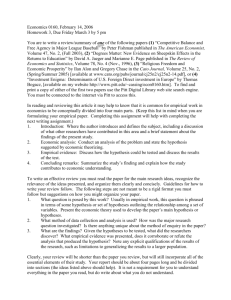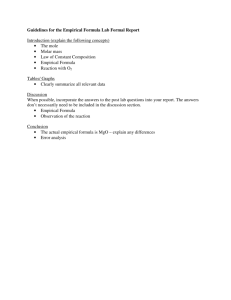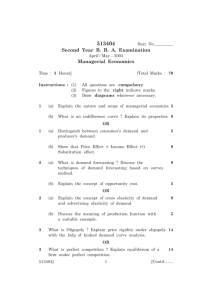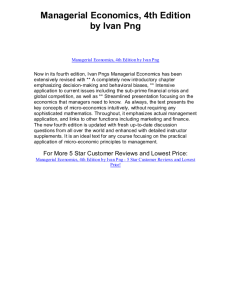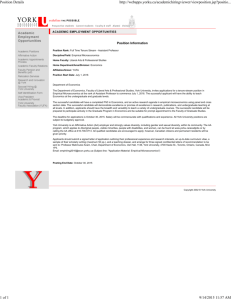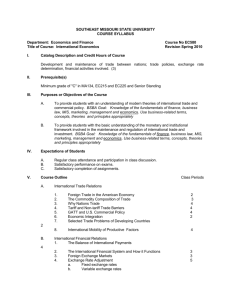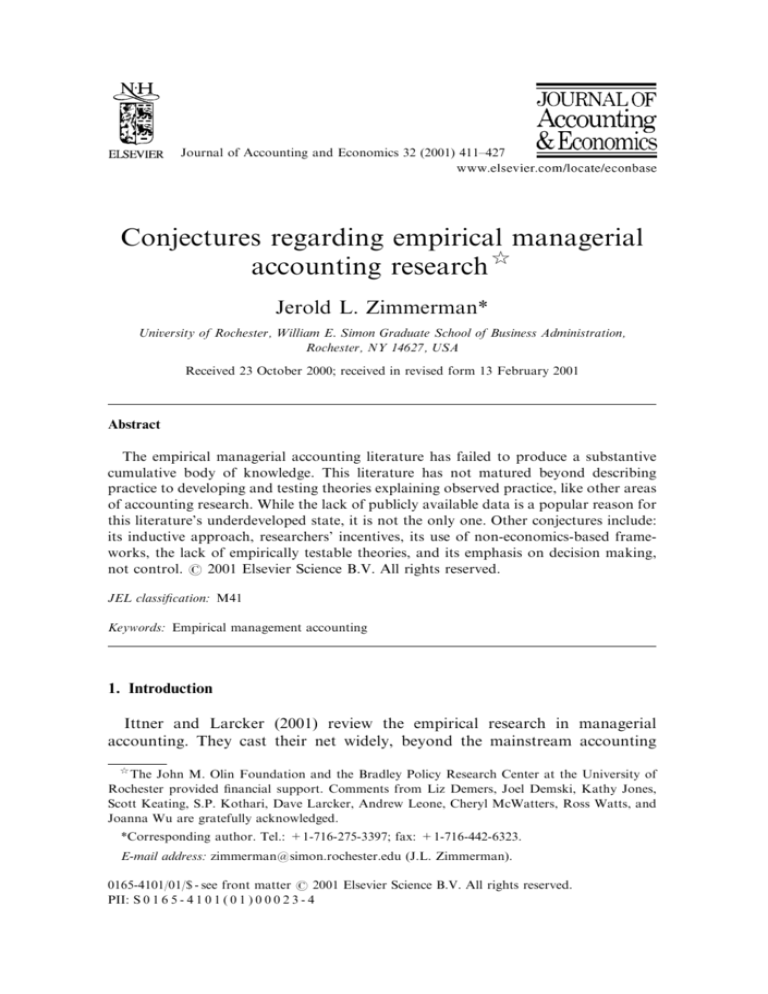
Journal of Accounting and Economics 32 (2001) 411–427
Conjectures regarding empirical managerial
accounting research$
Jerold L. Zimmerman*
University of Rochester, William E. Simon Graduate School of Business Administration,
Rochester, NY 14627, USA
Received 23 October 2000; received in revised form 13 February 2001
Abstract
The empirical managerial accounting literature has failed to produce a substantive
cumulative body of knowledge. This literature has not matured beyond describing
practice to developing and testing theories explaining observed practice, like other areas
of accounting research. While the lack of publicly available data is a popular reason for
this literature’s underdeveloped state, it is not the only one. Other conjectures include:
its inductive approach, researchers’ incentives, its use of non-economics-based frameworks, the lack of empirically testable theories, and its emphasis on decision making,
not control. r 2001 Elsevier Science B.V. All rights reserved.
JEL classification: M41
Keywords: Empirical management accounting
1. Introduction
Ittner and Larcker (2001) review the empirical research in managerial
accounting. They cast their net widely, beyond the mainstream accounting
$
The John M. Olin Foundation and the Bradley Policy Research Center at the University of
Rochester provided financial support. Comments from Liz Demers, Joel Demski, Kathy Jones,
Scott Keating, S.P. Kothari, Dave Larcker, Andrew Leone, Cheryl McWatters, Ross Watts, and
Joanna Wu are gratefully acknowledged.
*Corresponding author. Tel.: +1-716-275-3397; fax: +1-716-442-6323.
E-mail address: zimmerman@simon.rochester.edu (J.L. Zimmerman).
0165-4101/01/$ - see front matter r 2001 Elsevier Science B.V. All rights reserved.
PII: S 0 1 6 5 - 4 1 0 1 ( 0 1 ) 0 0 0 2 3 - 4
412
J.L. Zimmerman / Journal of Accounting and Economics 32 (2001) 411–427
journals and discuss papers in practitioner-oriented journals and non-North
American journals.1 In fact most of the papers they cite are in these nonmainstream journals. In addition to suggesting a variety of research
opportunities and discussing important methodology issues, Ittner and Larcker
(IL) offer several general observations regarding the empirical managerial
accounting literature.
(T)he research is driven by changes in practice. y(M)any papers are
motivated purely by the fact that a certain topic has received considerable
attention in the business press, with little effort to place the practice or study
within some broader theoretical context.
(W)e are left with an underdeveloped body of research that fails to build on
prior studies to increase our understanding of the topic, leaves many
important research topics unexplored, and lacks the critical mass of related
studies needed to reconcile conflicting results to reach consensus on the
performance benefits from various manufacturing performance measurement practices.
I agree with these generalizations. After reading their review of this literature, I
am left wondering what we have learnt. What generalizations can be drawn?
What null hypotheses have been rejected? What burning, unanswered
questions remain? Where are the intriguing anomalies? Or, in the parlance of
an old fast food restaurant ad for hamburgers, ‘‘Where’s the beef ?’’
The failure to produce a substantive body of knowledge is not IL’s fault. The
authors have faithfully discharged their responsibilities to survey the literature.
The failure lies with the literature itself. My comments focus on trying to
understand the current state of affairs in empirical managerial accounting
research. Why do so few generalizable findings exist? Why are so many of the
studies cited by IL published outside the mainstream, North American
accounting journals?
The empirical managerial literature focuses on describing current accounting
practice. Most other accounting research areas also started descriptively, but as
empirical findings accumulated, theories were developed to explain what was
observed and to predict phenomena yet to be observed. The empirical
managerial literature has failed to take this next step. Why? Hopefully, by
better understanding the reasons for this literature’s lack of progress, we will
avoid making the same mistakes in the future.
The next section discusses the framework IL use to organize the empirical
managerial literature. Section 3 compares the references cited in the IL survey
to the other survey papers in this volume. The next two sections describe the
1
They exclude most behavioral research, experimental and compensation studies, and qualitative
case studies.
J.L. Zimmerman / Journal of Accounting and Economics 32 (2001) 411–427
413
general function of research, and offer some conjectures as to why so little has
been learnt from empirical managerial studies. The last section provides some
conclusions.
2. Ittner–Larcker’s organizing framework
IL organize their empirical managerial accounting literature survey using the
Value Based Management (VBM) framework. This framework, distilled from
the consulting practices of several firms (notably McKinsey and KPMG),
consists of the following steps:
choose internal objectives that enhance shareholder value;
select strategies and organizational designs to achieve the objectives;
identify performance variables that create value;
develop action plans;
evaluate the success of action plans;
assess and modify the internal objectives, strategies, plans, and control
systems.
*
*
*
*
*
*
Copeland et al. (1996) of McKinsey basically present this framework as a
normative approach. All firms should follow it. It does not make predictions
about when particular compensation schemes will be used or what firms are
most likely to adopt ABC. While it resembles various theories, it is not a
positive theory in the sense that it neither explains nor predicts firm-related
phenomena. It seems better suited for organizing a consulting engagement.
IL could have chosen a theory-based framework, such as the principal-agent
paradigm incorporating the Milgrom and Roberts (1995) complementarities
approach. It is well understood among academics that decision right
assignments, performance measures, compensation plans, and other policies,
are jointly determined, interdependent, and endogenous.2 IL recognize these
limitations of the VBM framework, and discuss the methodological issues
raised (endogeneity and simultaneity). The primarily normative VBM framework portends the nature of the literature, its focus, and I believe its ultimate
success.
Most of the studies reviewed by IL address practice (ABC, EVA, balanced
scorecard). Many of IL’s recommended research topics focus on practice.
‘‘Researchers can make a significant contribution by providing evidence on the
methods used to set financial and non-financial targets and the performance
implications from these choices.’’ Empirical managerial accounting research
has not evolved much beyond description of practice to developing and testing
theories suggested from practice. In Section 4, I discuss the general nature of
2
See Brickley et al. (2001) for a review.
414
J.L. Zimmerman / Journal of Accounting and Economics 32 (2001) 411–427
how knowledge accumulates from theory-based research. I argue that little has
been learnt from this literature, partly because researchers’ incentives have
shifted towards describing practice rather than developing and testing theories.
Describing practice, per se, is not unproductive. If the objective of research is
producing empirically verifiable theories, a rich description of practice often
leads to new theories. For example, finance researchers first documented the
random walk of security prices, which lead to the efficient markets hypothesis
(see Fama, 1965). However, the risk is that descriptive research can lead
toFand even be motivated byFnormative consulting engagements, and not
to theory development and testing. Descriptive research alone will not build a
coherent literature and understanding of managerial accounting practices.
3. Empirical analysis of the empirical managerial accounting literature
In this section I compare the references cited by IL to those cited by the other
eight surveys in this volume. Each reference in nine survey papers is categorized
into one of eight categories listed in Table 1.3 I present the following evidence
cautiously. No attempt is made to eliminate references that did not summarize
research but rather provided background. Drawing inferences from this data
assumes that the citation frequencies in the survey papers are unbiased
estimates of the citation frequencies in the literature. Clearly, the citation rates
in the various survey papers depend on the scope and objective of each survey
and the nature of the topic. Given these caveats, the evidence should be viewed
as suggestive.
Table 2 lists the distribution of references cited by IL, the distribution of all
the references in the other eight surveys, and the individual distributions of the
other eight surveys. The IL survey cites far fewer mainstream North American
accounting journals, but cites more non-mainstream accounting and practitioner journals than the other eight survey papers.4 Only 23% of the references
in IL are to mainstream North American accounting journals, whereas in the
other eight studies 51% of the citations are in these journals. This is due in part
to IL’s objective of casting their net widely. It also results from few published
papers to review in the North American journals.
Equally as dramatic as the preceding citation rates is IL’s low reference
frequency to economics, finance, and statistics literatures compared to the
other eight surveys (9% versus 24%). These citation rates are consistent with a
literature that draws less on economics and finance than other areas of
3
The references are counted in the version of each paper presented at the conference in April
2000.
4
IL’s citation distribution is statistically significantly different from the combined distribution
and the eight individual distributions at the 0.05 level based on chi-square tests.
J.L. Zimmerman / Journal of Accounting and Economics 32 (2001) 411–427
415
Table 1
Eight categories used to classify references cited in the nine surveys in this volume
Category
Mainstream North American
accounting journals
Accounting Review
Contemporary Accounting Research
Journal of Accounting and Economics
Journal of Accounting Research
Review of Accounting Studies
Other accounting journalsa
Accounting Horizons
Academy of Management Accounting
Accounting, Organizations, and Society
Journal of Accounting, Auditing and Finance
Journal of Accounting and Public Policy
Journal of Accounting Literature
Journal of Business, Finance, and Accounting
Journal of Management Accounting Research
Management Accounting Research
Working papers
F
F
Books and monographs
a
Economics, finance, and statistics journals
American Economic Review
Bell/Rand Journal of Economics
Econometrica
Journal of the American Statistical Association
Journal of Economic Literature
Journal of Finance
Journal of Financial and Economics
Journal of Political Economy
Journal of Public Economics
Quarterly Journal of Economics
Practitioner-oriented journalsa
Accounting and consulting firm publications
AICPA and FASB publications
Financial Analysts Journal
Harvard Business Review
Institute of Management Accountants
Journal of Applied Corporate Finance
Management and strategy journalsa
Academy of Management Journal
Journal of Business Strategy
Strategic Management Journal
Tax journalsa
Journal of the American Taxation Association
National Tax Journal
a
Representative journals, but not an exhaustive set.
accounting research. Fewer citations to economics and finance is consistent
with a literature oriented to describing practice, not testing theories (which
often are based on economics or finance). Only 3% of IL’s citations are to
416
Ittner and Other
Bushman Fields, Lys Healy and Holthausen Kothari Lambert Shackelford Verrecchia
Larcker
8 papers and Smith and Vincent Palepu
and Watts
and Shevlin
Mainstream North American
accounting journals
Other accounting journals
Working papers
Books and monographs
Economics, finance and
statistics journals
Practitioner-oriented journals
Management and strategy
journals
Tax journals
Total references
23%
51%
33%
87%
67%
58%
45%
48%
44%
79%
30%
8%
13%
9%
4%
11%
5%
24%
3%
16%
5%
40%
4%
2%
1%
3%
7%
10%
1%
13%
13%
17%
4%
4%
4%
11%
7%
29%
4%
9%
9%
31%
1%
15%
4%
14%
8%
0%
0%
13%
13%
3%
2%
0%
2%
1%
2%
0%
2%
0%
4%
0%
3%
0%
0%
0%
1%
0%
0%
0%
0%
3%
0%
0%
0%
0%
0%
0%
20%
0%
194
1364
221
141
84
144
551
111
194
62
J.L. Zimmerman / Journal of Accounting and Economics 32 (2001) 411–427
Table 2
Distribution of references of papers published in this volume
J.L. Zimmerman / Journal of Accounting and Economics 32 (2001) 411–427
417
management and strategy journals, which suggests that the papers they review
are not testing behavioral science theories either.
Similar inferences regarding the empirical managerial literature are obtained
when IL’s citation rates are compared to each of the individual eight
surveys’ citation rates. Looking at the eight individual surveys, we observe
that each cites more mainstream accounting journals and finance, economics,
and statistics journals and fewer professional/practitioner journals than the IL
review.5
Upon closer examination of IL’s references, 44 cited papers are in the
mainstream North American accounting journals. After excluding 13
compensation studies and seven theory papers, 24 empirical managerial papers
are published in these journals. Certainly, the shortage of empirical managerial
papers published in mainstream North American accounting journals reflects
the scarcity of data. I conjecture below that other reasons are contributing
factors as well.
To summarize this section, IL cite more papers in practitioner-oriented
journals and more papers outside the mainstream North American accounting
journals, and rely less on economics, finance, and statistics than the other
eight survey papers. These citation frequencies are consistent with the
empirical managerial literature being long on describing practice (data
description) and short on developing and testing hypotheses derived from
economics and finance.
4. Role of theory in empirical studies
I assert that one reason that the empirical managerial literature has failed
to produce a coherent body of knowledge is because the literature’s objective
is not to test theories. Moreover, in the few studies that do test theories,
their hypotheses are often ad hoc or derived from a variety of different
disciplines (contingency theory or expectancy theory). Unlike the incentive
compensation studies (that began by explaining practice but now test
agency-theoretic hypotheses) and capital market studies (that began by
explaining practice but now test financial economics hypotheses), no unifying,
economics-based theory has developed to guide empirical managerial
accounting research.
Succinctly stated, a theory explains what has been observed, tests empirically
the hypotheses derived from the theory, and then predicts what is yet to be
5
Only 3% of the Fields et al. (2001) citations and 4% of the Holthausen and Watts (2001)
citations are to economics, finance, and statistics. But 87% and 58% of the Fields et al. and
Hothausen and Watts citations, respectively, are to mainstream North American accounting
journals.
418
J.L. Zimmerman / Journal of Accounting and Economics 32 (2001) 411–427
observed. As Hempel (1966) explains, knowledge accumulates through the
systematic testing of hypotheses suggested by theories. Theory allows the
systematic ordering of facts. Most survey papers in this volume offer an
underlying theoretic framework to organize their literatures. Testing hypotheses derived from theory allows knowledge to accumulate in the sense that
refuted hypotheses force revisions in the underlying theory. Theories seek to
explain systematic empirical regularities and, generally, to afford a deeper and
more accurate understanding of the phenomena in question. Theory broadens
our knowledge and understanding by predicting and explaining phenomena
that were not known when the theory was formulated. Theories suggest
hypotheses that help guide scientific investigations regarding data to collect.
The essential point is ‘‘without y hypotheses, data analysis and classification
is blind’’ (Hempel, 1966, p. 13). Early descriptive studies often start with
preliminary (‘‘strawmen’’) hypotheses.6
Theory construction and empirical research interact. As described earlier,
just as theories stimulate empirical work, rich empirical settings stimulate
theory. Empirical facts and regularities cause theorists to construct explanations for what is observed. But in addition, theories make predictions about
facts that have not yet been collected. Eventually, empirical anomalies cause
theory revision (Kuhn, 1969).
Some might argue that without data, generating hypotheses is a useless
activity. However, clever empiricists will discover interesting data sets to test
important hypotheses. This is especially true today given the wide variety of
machine-readable data sets available and access to internet-based information.
It is easy to overlook, but important to emphasize, how economic principles
generate testable hypotheses and allow the accumulation of knowledge about
accounting. Consider the LIFO/FIFO method choice. This literature is
summarized in Kothari (2001), Fields et al. (2001), and Shackelford and
Shevlin (2001). Given the descriptive studies of stock prices (their random walk
behavior) and using principles from economics, financial economists deduced
the efficient markets hypothesis. One implication of this hypothesis (and the
maintained hypothesis about capital markets valuing cash flows) predicted that
firms shifting to LIFO for both tax and financial reporting (because of the tax
conformity rule) should have positive abnormal returns to the extent the
market did not anticipate the LIFO adoption. The alternative, mechanistic
hypothesis predicted negative abnormal returnsFthe market is functionally
fixated on accounting earnings, which are now lower. The early tests were
consistent with market efficiency (Sunder, 1975). Later studies refined the
earlier tests using more sophisticated hypotheses as inconsistencies in earlier
6
For example, the early executive compensation studies (e.g., Coughlan and Schmidt, 1985;
Murphy 1985) sought to reject the hypothesis that pay and performance were unrelated, as was
often claimed in the popular press at the time.
J.L. Zimmerman / Journal of Accounting and Economics 32 (2001) 411–427
419
tests were discovered. As the research proceeded, knowledge about the
efficiency of the capital markets with respect to accounting information
accumulated and our theories of market efficiency evolved.
Accounting empiricists often underestimate the importance of rigorous
theory in designing their studies. Weak theory development is probably the
most recurring reason for the accounting journals to reject empirical papers. A
paper’s motivation and contribution critically depend on theory. Theory
structures the study and suggests alternative hypotheses.
Theories need not be stated in terms of mathematics. The essential element is
the logic of the analysis. Mathematics makes the logic more rigorous and
transparent. For example, consider agency theory that examines the trade-off
between incentives and risk. Mathematics has proven very useful in developing
a series of rigorous principal-agent models (Lambert, 2001). However,
important theories exist that were not stated in mathematical terms. Consider
Fama’s (1965, 1970) statement of the efficient markets hypothesis, Williamson’s (1975, 1985) transaction cost economics, and the Jensen and Meckling
(1976) agency theory. These are important non-mathematical theories. But
more importantly, they spawned a wide variety of empirical work seeking to
test the theories’ hypotheses. Other examples of non-mathematical theories
abound: Coase’s (1937) theory of firms versus markets, Stigler’s (1971) theory
of regulation, the Watts and Zimmerman (1978, 1986) positive theory of
accounting choice, the Scholes and Wolfson (1992) tax framework, and the
Smith and Watts (1992) predictions regarding incentives and firms’ investment
opportunity sets. Bushman and Smith (2001) describe a non-mathematical
theory of accounting and corporate governance in this volume.
5. Conjectures regarding the empirical managerial accounting literature
In this section I offer six conjectures regarding why the empirical managerial
literature has failed to accumulate a systematic set of findings. They include:
the lack of reliable, consistent data; the literature’s atheoretical approach;
changing incentives of researchers; the literature’s failure to embrace
economics as its underlying discipline; few empirically testable theories; and
the literature’s almost exclusive focus on decision making, not control.
5.1. Lack of data
The paucity of ‘‘good’’ data is a longstanding and popular refrain for the
empirical managerial accounting literature’s lack of progress. Compared to
financial accounting research with its Compustat, EDGAR, CRSP, IBES, and
NAARS files, empirical managerial research is definitely wanting. Probably the
single biggest factor hampering empirical managerial research is the lack of
420
J.L. Zimmerman / Journal of Accounting and Economics 32 (2001) 411–427
consistent data about what firms do internally. No cross-sectional data set
exists about firms’ budgeting systems, transfer pricing methods, standard cost
systems, cost allocation schemes, and so forth. This has a number of
implications:
Doctoral students gravitate away from this research area towards data-rich
environments, such as capital markets, executive compensation, and tax.
Data collected from surveys suffer from well-known problems such as
response and surveyor biases. These limitations require researchers to be
more careful in drawing inferences from studies employing survey methods.
Data collected from companies to which researchers happen to have access
are likely to be a non-random sample of firms. For example, firms having
problems may be more willing to allow researchers access than successful
firms concerned about potential competitors gaining access to their
proprietary data.
To the extent researchers gain access to proprietary data sets their studies
are not replicable. However, useful insights can be gleaned from such data
sets.
Clearly, ‘‘better’’ data is always preferred to ‘‘poorer’’ data. But it is hard to
lay all the blame for the empirical managerial accounting literature’s lack of
progress on this one reason. Economics has tackled very interesting, nontraditional questions and made considerable progress on them lacking
machine-readable, standardized data. Lazear (2000) describes numerous
examples where economists have successfully attacked non-traditional
problems (discrimination, the family, theory of the firm, and education).
Many of these studies rely on the creative use of ad hoc data sets. For example,
Wolfson’s (1985) oil and gas paper illustrates the insightful combination of
interesting theory and unique data. Masten and Crocker (1985) and Allen and
Lueck (1992) test incentive contracting hypotheses using natural gas contracts
collected by a US government agency, and landowner–farmer contracts from a
1986 Nebraska and South Dakota leasing survey, respectively. Given the
accomplishments of economists, I find it difficult to attribute our slow progress
in empirical managerial accounting to the scarcity of machine-readable data
sets.
Unfortunately, the ‘‘poor data’’ mantra has led to various dysfunctional
outcomes. ‘‘Poor data’’ is often used to justify weak (or no) theory and/or
badly designed and implemented research methods. Some researchers
mistakenly believe that all journal editors and referees impose the same
empirical standards on managerial studies as they do on large-scale financial
accounting studies. This belief is used to avoid these journals and the
high academic standards they impose. However, 24 empirical managerial
J.L. Zimmerman / Journal of Accounting and Economics 32 (2001) 411–427
421
accounting studies have been published in mainstream North American
journals, thus refuting the claim that these journals reject all such papers.
5.2. Atheoretical approach
In 1986, the Harvard Business School held a colloquium on field studies in
managerial accounting to encourage ‘‘authors to understand and document the
management accounting practices of actual organizations. yA second, and
even more important, objective of the colloquium was to begin the process by
which field research methods in management accounting could be established
as a legitimate method of inquiry’’ (Bruns and Kaplan, 1987, p. 2–3).
Hopwood (1983), Kaplan (1983, 1984, 1986), and others encouraged
researchers to conduct more field-based studies documenting contemporary
practices. Kaplan (1986) describes a research process that first focuses on case
studies and field studies, and then eventually develops models and theories.
While Kaplan (1986) points out that theory is useful in guiding empirical
research, his prescription for managerial accounting research called for
observation and description. Accounting researchers should be ‘‘in the field
attempting to understand how accounting information is developed or used in
actual organizations’’ (p. 429).
Researchers will need to leave their offices and study the practices of
innovating organizations. y The challenge for academic researchers is to
discover the Pierre du Ponts, Donaldson Browns, Alfred Sloans, and
Frederick Taylors of the 1980s; to describe and document the innovative
practices that seem to work for successful companies. The research will be
more inductive than deductive, but likely productive both for the individual
researcher and for the management accounting discipline (Kaplan, 1984,
p. 415).7
Notice that Kaplan is not calling for researchers to go into the field and test
hypotheses from theories. He asserts that, unlike other social sciences,
managerial accounting has not ‘‘accumulated a reliable and systematic body
of factual knowledge’’(p. 432) and therefore, it is premature to develop theories
or test propositions.
7
Peters and Waterman (1982) adopted the same approach in their popular book, In Search of
Excellence. They studied the management practices of 62 large, successful US firms. Many of these
firms have failed to continue their previous performance trends (e.g., Atari, Eastman Kodak, Wang
Labs, Proctor & Gamble, Levi-Strauss, and Xerox). Few of the eight basic principles of Peters and
Waterman (bias for action, staying close to the customer, autonomy and entrepreneurship,
productivity through people, hands-on, value driven executives, stick to the knitting, simple form,
lean staff, dedication to central values) have provided the hoped for panacea predicted by the
authors. The problem is a lack of theory. The eight prescriptions of Peters and Waterman suggest a
‘‘one-size-fits-all’’ approach. All eight must be used.
422
J.L. Zimmerman / Journal of Accounting and Economics 32 (2001) 411–427
Over 15 years have elapsed since the first call for more descriptive field-based
research. Such a body of studies now exists. But it has not led to the theory
building and testing that was envisioned. Perhaps it is too early, not enough field
studies have accumulated, or the ones conducted are of low quality. These are
certainly plausible justifications. However, other accounting research areas did
not require 15 years between the initial descriptive research and eventual theory
building and testing. Alternatively, perhaps the appeal for primarily inductive,
descriptive research has not proven as productive a path as originally claimed.
Not every empirical paper must test hypotheses. Purely descriptive studies
that inform us about heretofore-unknown facts are useful. However, it appears
not to have been fruitful for researchers to wander the hallways of corporations
and manufacturing plants searching for facts unguided by tentative hypotheses. As Hempel (1966, p. 13) states,
(T)he maxim that data should be gathered without guidance by antecedent
hypotheses about the connections among the facts under study is selfdefeating, and it is certainly not followed in scientific inquiry. On the
contrary, tentative hypotheses are needed to give direction to a scientific
investigation.
5.3. Changing research incentives
Perhaps the empirical managerial accounting literature has failed to evolve
from describing practice to developing and testing theories because researchers
no longer have these incentives. Maybe researchers face stronger incentives to
describe practice than to develop and test theories. If business schools are
encouraging faculty to conduct more ‘‘practical’’ and less ‘‘theoretical’’
research, then faculty incentives have changed. Descriptive research usually
generates more citations in the popular press and thereby improves the school’s
reputation in the business community than more theoretical research. The 2000
Business Week business school rankings now include a measure of each
school’s ‘‘intellectual capital’’. Faculty citations in The Wall Street Journal and
Business Week, along with citations in scholarly journals are used to assess
intellectual capital. Faculty consulting also enhances the school’s presence in
the business community. All too often business students tend to value faculty
consulting activities over research, especially ‘‘theoretical’’ research to the
extent that a school’s ranking in the popular press depends on student and the
business community’s perceptions, schools have incentives to reward faculty
for descriptive research.
The audience of our research papers is no longer just others in the academy
as it was 30 years ago. Now, we seem to be conducting our research because it
informs practitioners (Demski and Zimmerman, 2000). For example, Maher
(2000, p. 341) states, ‘‘The motivation for some empirical research in
J.L. Zimmerman / Journal of Accounting and Economics 32 (2001) 411–427
423
management accounting has been to test the claims of consultants who propose
‘new’ management methods’’. If this conjecture is true, then other accounting
research areas should also be witnessing a similar movement from developing
and testing theories to practitioner-oriented studies.8
5.4. Non-economics-based frameworks
Lazear (2000) argues that ‘‘economics is the premier social science’’, citing its
expanding scope of inquiry beyond consumers, firms, and markets into
explaining other social interactions and its adoption by other disciplines
(finance, accounting, law, political science, and sociology). ‘‘Economics has
been successful because, above all, economics is a science.’’ The other
accounting areas surveyed in this volume (accounting choice, agency theory,
capital markets, corporate governance, disclosure, tax, and value relevance)
almost exclusively rely on economics-based theory.
Other social sciences, such as cognitive psychology, could provide the
necessary basic framework to develop accounting theories. However, the
empirical evidence from the last 40 years indicates that with few exceptions,
most accounting research innovations have their conceptual roots in
economics.9 Either economics is more powerful or alternatively, the critical
mass of accountants well trained in other social sciences is too small to produce
a cumulative literature in accounting. (Creating knowledge requires large
economies of scale involving skilled researchers who employ an underlying
framework that uses a common language.)
To the extent, empirical managerial studies test hypotheses, they often
employ non-economics-based theories (expectancy theory and contingency
theory). If economics-based hypotheses are more productive in furthering
knowledge than other social sciences (as suggested by Lazear), then another
factor retarding empirical managerial accounting’s lack of progress is its
reliance on non-economics-based theories.
8
Casual observations of the value relevance and valuation literatures are consistent with this
conjecture. See Holthausen and Watts (2001) and Kothari (2001).
9
Consider the following partial list: the role of accounting disclosures in capital markets relies on
the efficient markets hypothesis and capital asset pricing model; many of the topics taught in
managerial accounting such as fixed versus variable costs, transfer pricing, and cost allocations are
based on microeconomics; information economics spawned theories of accounting disclosures, the
audit risk model, and revealed flaws in the controllability principle; the early normative debates
regarding the theory of income measurement often relied on economic income; agency theory has
generated models of contracting and stimulated compensation research; experimental markets
research has generated similar studies in accounting; economic theories of the firm and corporate
governance have stimulated accounting choice and earnings management studies; and much of the
accounting-based tax research follows from the economics paradigm of Scholes and Wolfson
(1992).
424
J.L. Zimmerman / Journal of Accounting and Economics 32 (2001) 411–427
5.5. Few empirically testable theories
While managerial accounting empiricists have been lax in developing and
testing hypotheses derived from rigorous theories, managerial accounting
theorists share some of the blame. Rigorous managerial accounting theory
papers too infrequently take the next step and tease out the theory’s empirical
implications (testable hypotheses). Rarely do we observe sub-sections in theory
papers titled, ‘‘Empirical Predictions’’. To some, mathematical elegance (and
certainly tractability) seems preferred over relevance. An implicit assumption
apparently exists that theorists should develop models and empiricists should
take these models and deduce the empirical implications from the theory. More
high quality empirical managerial research would be forthcoming if theorists
made a greater effort to generate models with testable predictions and to
discuss their models’ empirical implications.
5.6. Emphasis on decision making, not control
It is well understood that accounting systems serve both decision making
and control roles (Zimmerman, 2000). However, much of the empirical
managerial research and the practice literature on which it is based emphasize
the decision making/planning function to the near exclusion of control. For
example, total quality management, re-engineering, activity-based costing, the
theory of constraints, value chain management, just-in-time, and the balanced
scorecard all assume that agents will enthusiastically adopt the new approach
because it promises to maximize firm value. The maintained assumption of
ABC is that if you provide managers with supposedly more accurate product
costs they will embrace them. This ‘‘Field of Dreams’’ (if you build it, they will
come) approach ignores employee self-interest. In particular, adopting ABC
creates windfall gains and losses among internal managers because product
costs are part of most firms’ internal control systems.
Except for the recent interest in economic value-added metrics, most
management fads have shunned new techniques that better align shareholder
and employee interests. It has become popular among practicing management
accountants to assert that their role includes both planning (improve decision
making) and control (reduce agency conflicts). They wish to become an equal
member of the decision-making team (Siegel and Sorensen, 1999, p. 5).
Note the difficulty in empirically assessing the relative importance of decision
making or control for a given firm’s accounting system. In equilibrium, firms’
control systems should not be binding, and hence it would appear that
accounting systems are not being used for control.
I am unsure as to why some academic and practicing accountants seem to
favor accounting’s decision-making role in favor of its control role. Maher
(2000) and Siegel and Sorensen (1999) argue that the term ‘‘accountant’’
J.L. Zimmerman / Journal of Accounting and Economics 32 (2001) 411–427
425
appears to have an increasingly negative connotation among students and
practitioners. In 1999, the Institute of Management Accountants changed the
name of its monthly magazine from Management Accounting to Strategic
Finance. Accountants are viewed as passive bystanders or scorekeepers while
others ‘‘play the game’’.10 Perhaps decision-making-type research is more
popular to practitioners, and hence accounting researchers have more
incentives now to conduct such studies. As much as practitioners and
academics would like to believe, firms’ internal accounting systems are used
primarily for decision making, wishing it so does not make it happen. If
researchers enter field sites thinking the accounting system is being used for
decision making when in fact it is being used for control, then an incorrect
implicit theory is guiding their data collection and analysis. Little wonder that
the empirical findings from a misguided theory produces scant results.
Holthausen and Watts (2001) draw a similar conclusion about value relevance
research in financial accounting.
6. Conclusions
IL observe that the empirical managerial literature has failed to develop a
body of knowledge that builds on prior studies and has left many important
questions unanswered. The literature has failed to move from describing
practice to developing and testing theories, as have other accounting areas.
Certainly the lack of progress is partially attributable to the difficulties in
securing ‘‘good’’ data. However, other fields (notably economics) have
overcome data limitations. A Compustat-like data set for management
accounting is unlikely to be produced. Nonetheless, individual researchers
can become more innovative in discovering interesting data sets.
Progress requires better collaboration between managerial accounting
empiricists and theorists. Theorists should seek to develop models that yield
refutable implications. And empiricists must stop using the ‘‘bad data’’
apology to excuse papers that either do not test hypotheses or test poorly
formulated hypotheses. Managerial accounting researchers likely are best
served by relying on economics-based hypotheses. Finally, accounting
researchers should not ignore why accounting is what it is. Management
accountants used to be called ‘‘controllers’’. While some may find the control
10
Recognizing that accounting’s primary role is control, might be unpopular to some. ‘‘Control’’
raises the specter of agency problems, self-interest, and hence ‘‘greed’’. Some people find it
unseemly to view society as avaricious. Viewing management accounting as part of a firm’s control
system makes accountants into cops and places them outside of the decision-making team. A
similar tendency to ignore accounting’s control function exists in capital markets research that
focuses on descriptive research with little theory building (value relevance and valuation). See
Holthausen and Watts (2001) and Kothari (2001) for surveys of these literatures.
426
J.L. Zimmerman / Journal of Accounting and Economics 32 (2001) 411–427
function of accounting pejorative, ignoring this likely important function leads
to incorrect theories being applied and ultimately to studies that do not
enhance our stock of knowledge.
To the extent that incentives within business schools have shifted towards
more consulting-like, practice-oriented research, then less theory development
and testing papers will be written. In the long run, our stock of knowledge, not
only in empirical managerial accounting research, but also in all areas of
accounting inquiry, will suffer.
References
Allen, D., Lueck, D., 1992. Contract choice in modern agriculture: cash rent versus cropshare.
Journal of Law and Economics 35, 397–426.
Brickley, J., Smith, C., Zimmerman, J., 2001. Managerial Economics and Organizational
Architecture. Irwin McGraw-Hill, Boston.
Bruns, W., Kaplan, R. (Eds.), 1987. Accounting and Management Field Study Perspectives.
Harvard Business School Press, Boston.
Bushman, R., Smith, A., 2001. Financial accounting information and corporate governance.
Journal of Accounting and Economics 32, 237–333.
Coase, R., 1937. The nature of the firm. Economica, New Series 4, 386–405.
Copeland, T., Koller, T., Murrin, J., 1996. Valuation: Measuring and Managing the Value of
Companies. Wiley, New York.
Coughlan, A., Schmidt, R., 1985. Executive compensation, management turnover, and firm
performance. Journal of Accounting and Economics 7, 215–226.
Demski, J., Zimmerman, J., 2000. On ‘‘research vs. teaching’’: a long-term perspective. Accounting
Horizons 14, 343–352.
Fama, E., 1965. The behavior of stock market prices. Journal of Business 38, 34–105.
Fama, E., 1970. Efficient capital markets: a review of theory and empirical work. Journal of
Finance 25, 383–417.
Fields, T., Lys, T., Vincent, L., 2001. Empirical research on accounting choice. Journal of
Accounting and Economics 31, 255–307.
Healy, P., Palepu, K., 2001. A review of the voluntary disclosure literature. Journal of Accounting
and Economics 31, 405–440.
Hempel, C., 1966. Philosophy of Natural Science. Prentice-Hall, Englewood Cliffs, NJ.
Holthausen, R., Watts, R., 2001. The relevance of value relevance. Journal of Accounting and
Economics 31, 3–75.
Hopwood, A., 1983. On trying to study accounting in the contexts in which it operates.
Accounting, Organizations and Society 287–305.
Ittner, C., Larcker, D., 2001. Assessing empirical research in managerial accounting: a value-based
management perspective. Journal of Accounting and Economics 32, 349–410.
Jensen, M., Meckling, W., 1976. Theory of the firm: managerial behavior, agency costs and
ownership structure. Journal of Financial Economics 3, 305–360.
Kaplan, R., 1983. Measuring manufacturing performance: a new challenge for management
accounting research. Accounting Review 58, 686–705.
Kaplan, R., 1984. The evolution of management accounting. Accounting Review 59, 390–418.
Kaplan, R., 1986. The role for empirical research in management accounting. Accounting,
Organizations and Society 11, 429–452.
J.L. Zimmerman / Journal of Accounting and Economics 32 (2001) 411–427
427
Kothari, S., 2001. Capital markets research in accounting: a value-based management perspective.
Journal of Accounting and Economics 31, 105–231.
Kuhn, T., 1969. The Structure of Scientific Revolutions. University of Chicago Press, Chicago.
Lambert, R., 2001. Contracting theory and accounting. Journal of Accounting and Economics 32,
3–87.
Lazear, E., 2000. Economic imperialism. Quarterly Journal of Economics 115, 99–146.
Maher, M., 2000. Management accounting education at the millennium. Issues in Accounting
Education 15, 335–346.
Masten, S., Crocker, K., 1985. Efficient adaptation in long-term contracts: take-or-pay provisions
for natural gas. American Economic Review 75, 1083–1093.
Milgrom, P., Roberts, J., 1995. Complementarities and fit: strategy, structure, and organizational
change in manufacturing. Journal of Accounting and Economics 19, 179–208.
Murphy, K., 1985. Corporate performance and managerial remuneration: an empirical analysis.
Journal of Accounting and Economics 7, 11–42.
Peters, T., Waterman, R., 1982. In Search of Excellence. Warner Books, New York.
Scholes, M., Wolfson, M., 1992. Taxes and Business Strategy. Prentice-Hall, Englewood Cliffs, NJ.
Shackelford, D., Shevlin, T., 2001. Empirical tax research in accounting. Journal of Accounting
and Economics 31, 321–387.
Siegel, G., Sorensen, J., 1999. Counting More, Counting Less: Transformations in the Management
Accounting Profession. Institute of Management Accountants, Montvale, NJ.
Smith, C., Watts, R., 1992. The investment opportunity set and corporate financing, dividend and
compensation policies. Journal of Financial Economics 32, 263–292.
Stigler, G., 1971. The theory of economic regulation. Bell Journal of Economics and Management
Science 2, 3–21.
Sunder, S., 1975. Stock price and risk related to accounting changes in inventory valuation.
Accounting Review 50, 305–315.
Verrecchia, R., 2001. Essays on disclosure. Journal of Accounting and Economics 32, 97–180.
Watts, R., Zimmerman, J., 1978. Towards a positive theory of the determination of accounting
standards. Accounting Review 53, 112–134.
Watts, R., Zimmerman, J., 1986. Positive Accounting Theory. Prentice-Hall, Englewood Cliffs, NJ.
Williamson, O., 1975. Markets and Hierarchies. The Free Press, New York.
Williamson, O., 1985. The Economic Institutions of Capitalism: Firms, Markets, Rational
Contracting. The Free Press, New York.
Wolfson, M., 1985. Empirical evidence of incentive problems and their mitigation in oil and gas tax
shelter programs. In: Pratt, J., Zeckhauser, R. (Eds.), Principals and Agents: The Structure of
Business. Harvard Business School Press, Boston, pp. 101–125.
Zimmerman, J., 2000. Accounting for Decision Making and Control. Irwin McGraw-Hill, Boston.

